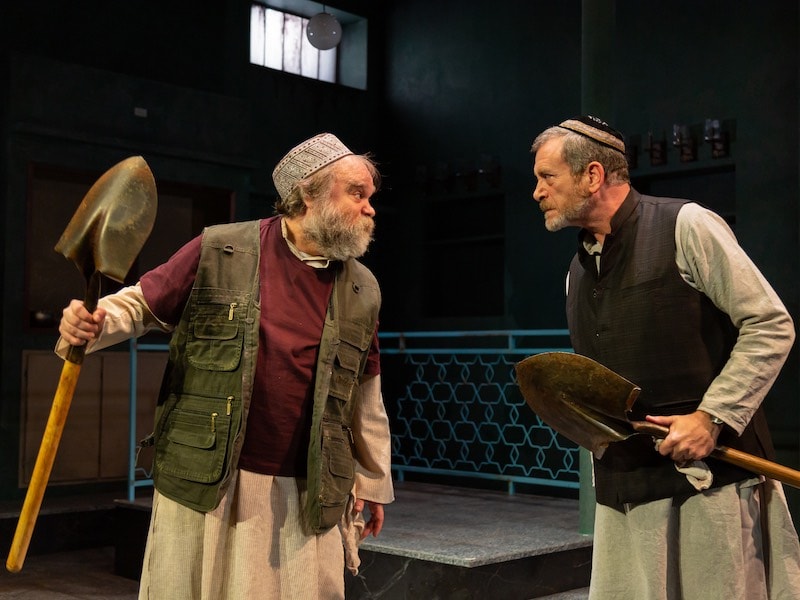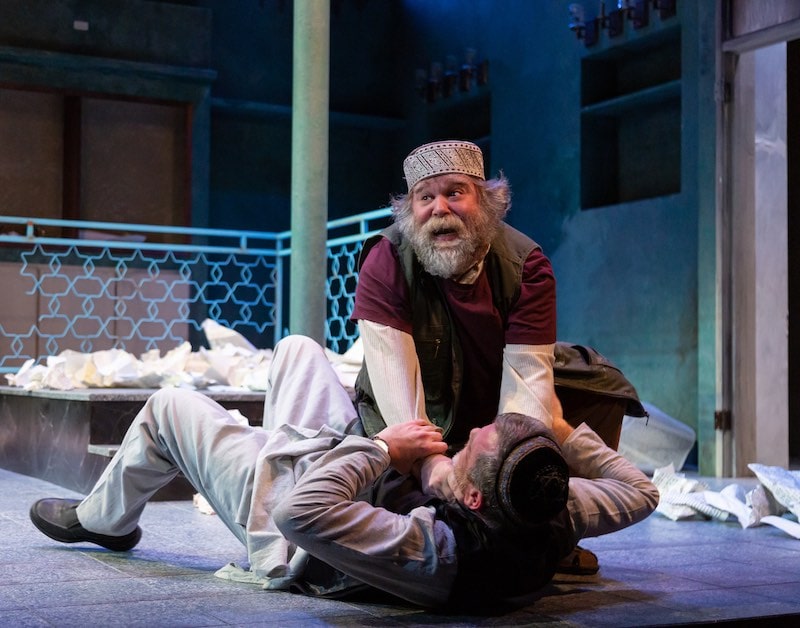The title says it all. Two Jews Walk Into a War… by Seth Rozin propels us from vaudevillian schtick into existential chaos throughout an evening of belly laughs tempered by the ongoing tragedy of anti-Jewish assaults, this time in Afghanistan.
Now playing at Theater J under the assured direction of Adam Immerwahr, the drama bristles with topical humor, recalls ancient debates, and speaks to the uncanny endurance of a people who refuse to be extinguished from history. It hits all these notes, from the ridiculous to the sublime, right on the old schnoz.
Rozin’s play was inspired by a real story. Beginning in 2001, several news outlets carried stories about the last two Jews living in Afghanistan. They shared a commitment to keeping up the last remaining synagogue in Kabul, a relic from the time when the Afghan population included tens of thousands of Jews. As if keeping the Jewish flame alive in an increasingly hostile country was not enough of a challenge, the two were hampered by yet another circumstance: they despised each other.

The play opens with Zebylan (Sasha Olinick) and Ishaq (Bobby Smith) flanking a plain coffin holding the body of Yakob — who had once served as a buffer between the two cantankerous men. Immediately, they begin to argue about who had a better relationship with the deceased. The stage is set for a series of zingers that will punctuate the entire one-act play.
Despite their profound differences, Zebylan and Ishaq decide to rebuild the synagogue, which was ravaged by the Taliban. But first, they need a Torah. Using a roll of butcher paper scavenged by Zebylan and relying on the startling memory of Ishaq, who can recite The Five Books of Moses by heart, they embark on their monumental task. Along the way, the more open-minded Zebylan questions the meaning of practically every phrase. Does God really sanction lesbianism by omission, when he clearly and profoundly prohibits sex between males? We dash down one rabbit hole after another with Zebylan while the increasingly irritated and far more observant Ishaq thunders on about never doubting HaShem, the Hebrew reference to God. Despite Zebylan’s skepticism (itself a time-honored Jewish tradition), he finally admits that the story told in the Torah “kind of grows on you.”
The Torah arguments form a good deal of the script — and contribute a lot to the scenery as well. Every time Zebylan makes a mistake transcribing Ishaq’s spelling or punctuation, that piece of the scroll must be ripped out and rewritten. Over the course of the play, balled-up pieces of “parchment” pile up all over the set. But somehow, the Torah gets done.
Rozin’s work recalls a welter of well-loved comedies and absurdist plays. The talented Olinick and Smith remind us of the high-minded, picky Felix and the irreverent Oscar who face off in The Odd Couple. The ripped-up Torah sends us back to the Marx Brothers’ “Sanity Clause” in A Night at the Opera as well as the swell of debris that piles up in Samuel Beckett’s Happy Days. Speaking of Beckett, there is more than a hint of Waiting for Godot as our two protagonists await a time when Jews will no longer be a persecuted minority.

Cleverly structured as a series of vignettes highlighting the 32-month period during which they create their Torah, the play goes to blackout after each wacky argument reaches its zenith, only to resume anew presumably weeks later, as the wasted paper builds up, tempers shorten, and the comic uproar continues. Yet we never lose sight of the melancholy that underlies the men’s existence. When, if ever, will the Jewish people cease being persecuted? How much longer can Jews hang onto their faith? Every time another booming Taliban missile strike sends more dust and rubble into the ancient building, Zebylan and Ishaq realize just how precarious their existence continues to be.
Scenic designer Jonathan Dahm Robertson enshrines the synagogue’s faded glory with its scant decoration and dusty, cracked woodwork. Lighting designer Alberto Segarra bathes the stage in blue light, underlining the essential sadness of the survivors’ lives. Sara O’Halloran’s sound design punctuates the blackouts with snatches of upbeat Klezmer and Middle Eastern music, readying us for the next episode.
Perhaps the most satisfying aspect of this novel play is how deftly Rozin navigates the action between funny, petty squabbling and overwhelming despair. The Jews are hardly the only people to face tragedy with a measure of comedy, but after 5,000 years of experience, they have gotten pretty good at it.
Real life, however, sometimes takes a different turn. After the American withdrawal in August 2021, and the retaking of Afghanistan by the Taliban, the last Jew — Zabulon Simentov — finally departed from Kabul. He immigrated to Israel, extinguishing the light of the synagogue that he and his late nemesis — Isaac Levy — had tried so stubbornly to keep lit.
Running time: 80 minutes with no intermission.
Two Jews Walk Into a War… plays through February 5, 2023, at Theater J at the Aaron & Cecile Goldman Theater in the Edlavitch DC Jewish Community Center, 1529 16th Street NW, Washington, DC. Purchase tickets ($65-$85, with member and military discounts available) online or by calling the ticket office at 202-777-3210.
The program for Two Jews Walk Into a War… is online here.
COVID Safety: All patrons in the Goldman Theater are required to wear masks covering their nose and mouth. Only performers and guests invited onstage may be unmasked. Masks are optional but encouraged in the Q Street and 16th Street lobbies, hallways, and other public spaces. For more information, visit Theater J’s COVID Safety Guidelines.





Best line of the play: “No feygeles.” It took a long moment for the joke to register. I had not heard the Yiddish word “feygeles” in, perhaps, 50 years. I will leave it w/o translation.